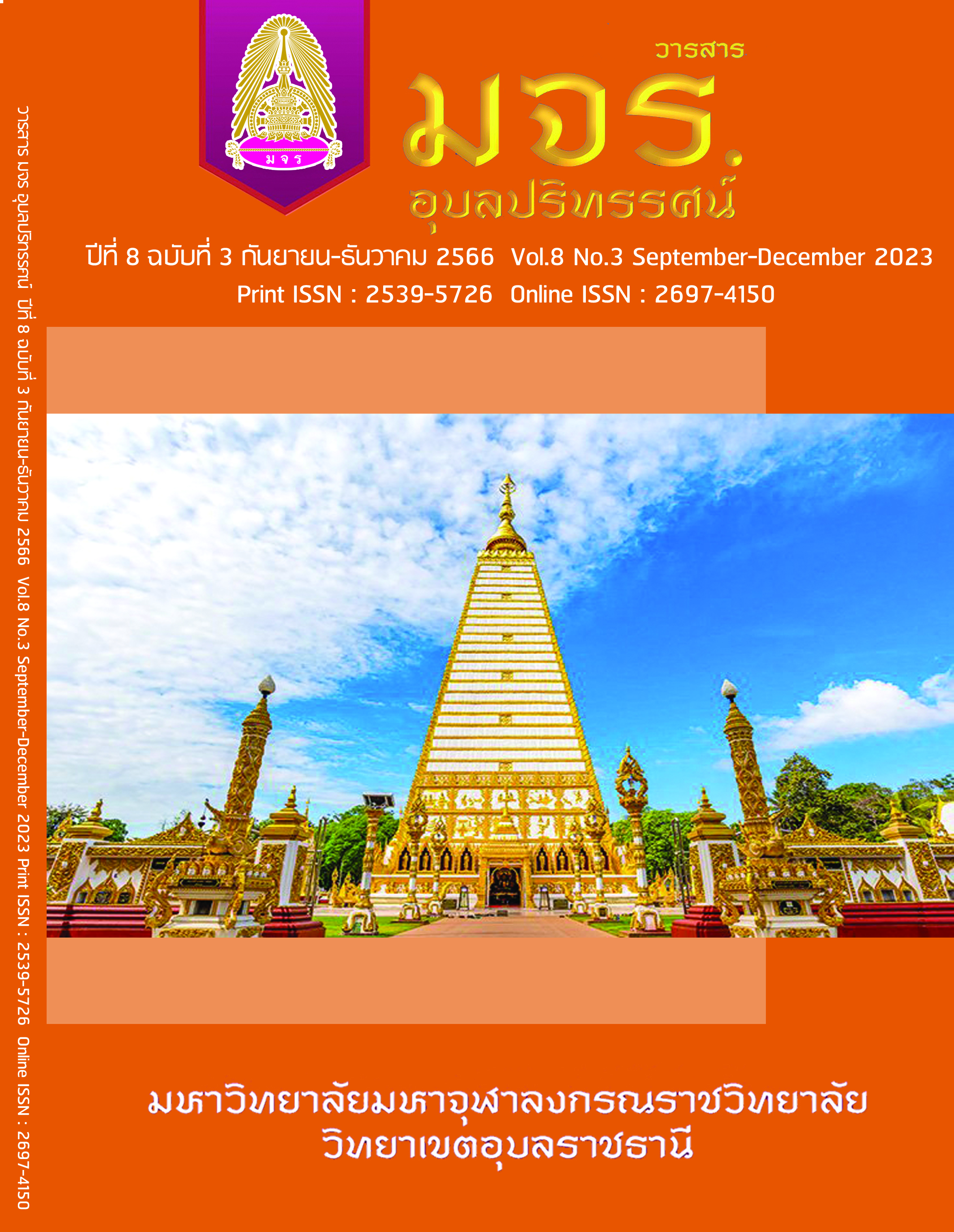วิถีการจัดการความกดดันตามปกติใหม่ของประชาชนในเขตภาคอีสานตอนล่าง
##plugins.themes.bootstrap3.article.main##
摘要
การเผชิญหน้าอย่างยากลำบากของการดำรงชีวิตท่ามกลางการแพร่ระบาดของโรค Covid-19 และปัญหาทางเศรษฐกิจสังคมที่รุมล้อม ส่งผลให้ประชาชนต้องแสวงหาวิถีปกติใหม่สำหรับการดำเนินชีวิตอยู่อีกต่อไปให้ได้ และด้วยเหตุนี้ผู้วิจัยจึงได้พัฒนาแบบสอบถามขึ้นมาจำนวน 64 ข้อ แล้วนำไปรวบรวมความเห็นของประชาชนที่อาศัยอยู่ในเขตจังหวัดอุบลราชธานี ยโสธร ศรีสะเกษ และสุรินทร์จำนวน 400 คนสำหรับนำกลับมาวิเคราะห์ผล โดยผลวิจัยพบว่าประชาชนมีวิถีการจัดการความกดดันตามปกติใหม่อยู่ 2 วิถีคือ การใช้หลักศาสนาและการช่วยเหลือกันเองทั้งที่มีต่อปัญหาและความกดดันที่ได้รับทั้งจากภาระงานกับค่าใช้จ่ายที่เพิ่มมากขึ้น รวมถึงนำไปใช้ในการดูแลและป้องกันสุขภาพของตนเองกับคนในครอบครัว ซึ่งทั้งสองวิถีมีสัมประสิทธิ์ในการพยากรณ์ที่ R 2 .15 อย่างมีนัยสำคัญทางสถิติที่ระดับ .05 นอกจากนี้แล้วผลวิจัยยังพบเพิ่มเติมอีกว่าปัจจัยที่ส่งผลต่อการตัดสินใจเลือกการช่วยเหลือกันเองมาเป็นวิธีการจัดการกับความกดดันนั้นประกอบด้วย 1) การสนทนากับคนในครอบครัวเดียวกัน 2) การทำอาหารรับประทานเอง 3) ความกังวลใจเกี่ยวกับความปลอดภัยในการเดินทาง 4) ความยุ่งยากในการดูแลสุขภาพ 5) การขาดความเชื่อมั่นและศรัทธาต่อระบบของสังคม กับ 6) การฝึกทักษะการทำงานใหม่ และ 7) ขนาดของความเครียด และทั้ง 7 ปัจจัยมีอิทธิพลต่อการตัดสินใจอย่างมีนัยสำคัญทางสถิติที่ระดับ .05 ด้วยเช่นกัน
##plugins.themes.bootstrap3.article.details##
参考
Charnnarong, C. (2021). Health care guidelines during covid-19 crisis by applying Buddhist principle, Journal of Humanities and Social Sciences Nakhon Phanom University, 11(2), 317-327.
Jaileawma, P. (2020). A study of new normal living behaviors during the covid-19 crisis appearing on the social media, thesis of Naresuan University.
Kaewyasri, K., & Soontanaviratana, B. (2021). The guidelines and impact from coronavirus disease (covid-19) in Loei Province, Academic Journal of Community Public Health, 7(1), 16-34.
Keiysinzum, J., & Toatong, S. (2021). Village health volunteers: roles of community mental health care in the situation of the covid-19 outbreak, Udonthani Hospital Medical Journal, 29(2), 314-323.
Khumsaen, N. (2021). Knowledge, attitude, and preventive behaviors of covid-19 among people living in Amploe U-thong, Suphanburi province, Journal of Prachonklao College of Nursing, Phetchaburi Province, 4(1), 33-48.
Kirdmanee, B., Tumtavitikul, S., Wachirasurong, Y., Sokbot, B., & Teekasap, S. (2020). Concepts and guidelines for solving covid-19, Advance Sciences Journal, 20(1), 1-12.
Maddava, P.S. (2021). Application of Buddhist principles as a guideline for dealing with the covid-19 pandemic, Journal of MCU Social Science Review, 10(1), 323-332.
Makim, R., Topothai, T., & Topothai, C. (2020). Lessons learnt from prevention and control of covid-19 pandemic: a case study of Argthong municipality, Journal of Health Systems Research, 14(4), 489-507.
Noonin, S., & Phuangprayong, K. (2019). Factor affecting in lifestyle of young generation in Thai rural society, Journal of Social Development, 21(2), 176-195.
Rungrut, S., Maso, S., & Kadem, Y. (2020). Impacts of economic and social matters from the covid-19 pandemic among the people in Yala city municipality, thesis of Yala Rajabhat University.
Sangsawangwatthana, T., Sirisaiyas, N., & Bodeerat, C. (2020). New normal a new way of life and adaptation of Thai people after covid-19: work education and business, Journal of Local Government and Innovation, 4(3), 371-386.
Siriwattano, P., Pomlamaurgdee, W., & Pharakrusrirattana. (2017). How to live longer according to the Buddhist way of life, Journal of Social Academic, 10 (Extra edition), 158-169.
Suvuddhano, P.S. & Phrapanyarattanakorn. (2020). The way of life according to Buddhist morality among covid-19, Journal of Multidisciplinary in Humanities and Social Sciences, 3(1), 115-128.
TDRI. (2020). ความเปราะบางของประชาชนกลุ่มเปราะบางภายใต้โควิค 19, https://tdri.or.th/2020/06/impact-of-covid19-on-vulnerable-groups/
Wongwasana, S. (2021). Negative influential factors from covid-19 pandemic on passenger service's happiness in work: a case study of Bangkok flight service (BFS), Rajapark Journal, 15(39), 15-30.


